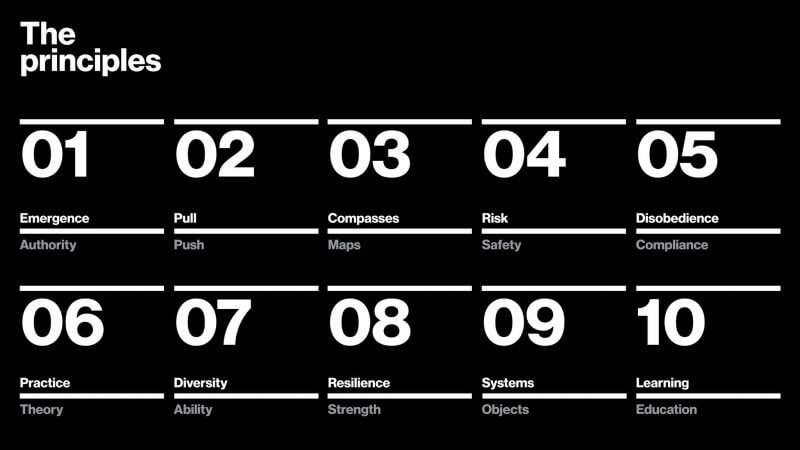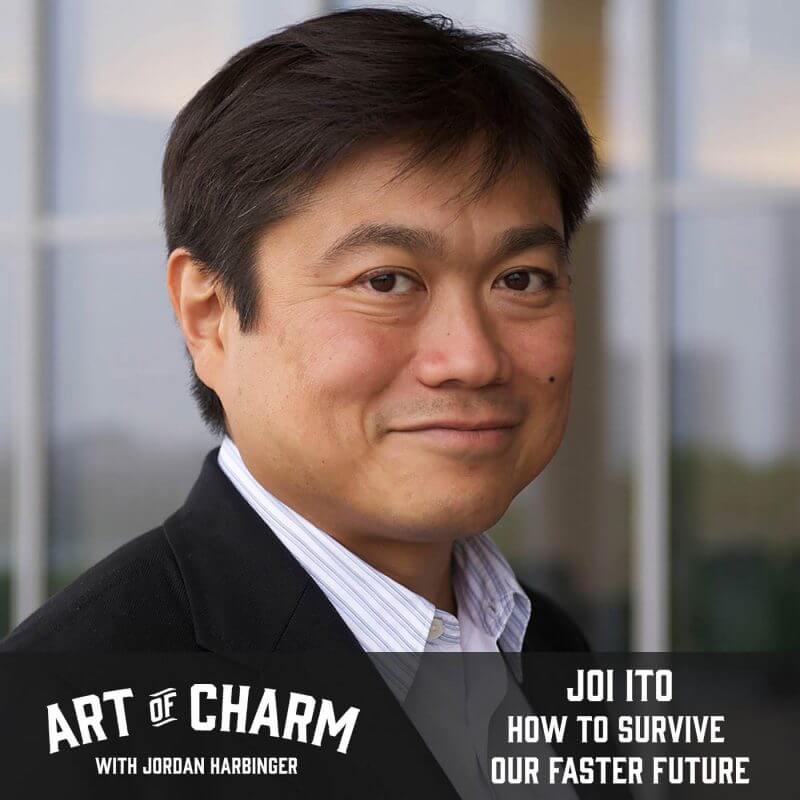Joi Ito (@joi) is the director of the MIT Media Lab, a professor of practice in media arts and sciences at MIT, and co-author of Whiplash: How to Survive Our Faster Future. [Photo by Andy Ryan]
“Education is what people do to you, and learning is what you do to yourself.” -Joi Ito
The Cheat Sheet:
- How does someone who dropped out of college three times wind up directing a lab at MIT?
- The pros and cons of formal learning vs. informal learning.
- Why does diversity make for better problem solving?
- What’s the secret to building a deep and diverse network?
- What do running a World of Warcraft guild and spinning records as a club DJ have to do with motivating groups and accomplishing big goals?
- And so much more…
[aoc-subscribe]
As we’ve learned from recent episodes of this show with visionaries like Peter Diamandis, Steven Kotler, and Kevin Kelly, the future is coming in unbelievable ways and at unbelievable speed.
In this round, we talk to MIT’s Joi Ito, co-author of Whiplash: How to Survive Our Faster Future. As a lifelong informal learner with a diverse background and an “addiction to always being slightly uncomfortable,” Joi shares the principles that keep him ahead of the curve as we hurtle toward a post-Internet future that grows ever more unpredictable. Listen, learn, and enjoy!
More About This Show
As “probably the least educated person” he knows at MIT, Whiplash: How to Survive Our Faster Future co-author Joi Ito doesn’t let this fact stop him from his duties as the director of the MIT Media Lab. In fact, being a three-time college dropout, jack of all trades and master of none works in his favor in this case.
Unofficially called “The Department of None of the Above,” The Media Lab began thirty-one years ago as a way to draw from MIT’s academic miscellany, which was more challenging than it may seem at first glance.
“The problem is, if you’re from academia, you typically tend to have a field of expertise — it’s hard for you to be interested in everything,” says Joi. “The director of the Media Lab needs to be kind of interested in everything. So my somewhat unusual background, which was I sort of did whatever I wanted and didn’t fit inside a discipline, turns out to be an okay profile for somebody to run this place.”
Hands-on, informal education has always provided Joi with more value than traditional textbook learning. It was spinning records as a full-time DJ in Chicago, not going to school, that taught Joi about authenticity, communication, and how to manage a creative community — tweaking “people’s behavior through culture,” he says.
In contrast, Joi’s sister — with the same opportunities — thrived in formal academia and got her PhD in education and anthropology. To her in the course of research, Joi was a subject of curiosity as an interest-driven learner. While it would be hard to call either path better or worse, Joi would be the first to say his way’s not necessarily the easiest way.

“I wouldn’t recommend this method if you’re good at traditional education,” says Joi, “because not having a degree and sort of fumbling around, you do expend a lot of energy and it’s not always the easiest. You have to kind of make up for it with extra effort and grit.”
This fumbling around can include a wide variety of random pursuits — whether it’s making movies to learn how movies are made, learning to SCUBA dive in order to feed sharks by hand, or running a World of Warcraft guild as a parallel to leading a team dedicated to open source development. Joi also acknowledges the efficacy of including a social element to the mix — the more diverse, the better.
“If you have ten scientists from the same school all working on the same problem, they’re less likely to solve it than if you have ten people from completely different backgrounds and cultures tackling the same problem,” says Joi.
Joi himself has the advantage of growing up in two cultures, so he’s no stranger to diversity — and existing in an area outside of anything resembling a comfort zone.
“I grew up going back and forth between Japan and the U.S.,” says Joi. “In Japan, they made fun of me because my Japanese was weird. And when I lived in the U.S., they made fun of me because I was a foreigner. I was never really comfortable; I was always on the edge of those two cultures. But I realized that I learned a lot going back and forth between the two and so I sort of became comfortable with being uncomfortable to the point where now…if I start getting comfortable, I feel like I’m not learning anything and that I might be in a bubble.”

Because he has what he calls “an addiction to always being slightly uncomfortable,” Joi seized the opportunity to live in Dubai for a while. He went from knowing nobody and seeing the Middle East as a place of chaos to building a network of friends and gaining a deeper understanding of the way things work there. Now when he watches the news, he’s able to analyze the bigger picture from both sides of the fence.
Listen to this episode of The Art of Charm in its entirety to learn more about why Joi learned more from being a DJ in Chicago than he ever did as a college undergraduate, how education is ultimately a social phenomenon, how the purpose of a new technology isn’t always obvious at first, what Joi’s Ten Principles entail and how they can help us survive the post-Internet world, why we sometimes need to unfocus in order to see what’s in our periphery, why risk over safety is the way to pull forward, how the Internet has lowered the cost of risk, and lots more.
THANKS, JOI ITO!
If you enjoyed this session with Joi Ito, let him know by clicking on the link below and sending him a quick shout out at Twitter:
Click here to thank Joi Ito at Twitter!
Resources from This Episode:
- Whiplash: How to Survive Our Faster Future by Joi Ito and Jeff Howe
- Joi’s Conversations Podcast
- Media Lab
- Joi’s website
- Joi at Facebook
- Joi at Instagram
- Joi at YouTube
- Joi at Twitter
- Lifelong Kindergarten
- Leadership in World of Warcraft by Joi Ito
- Coase’s Penguin, or Linux and the Nature of the Firm by Yochai Benkler
- Hanging Out, Messing Around, and Geeking Out: Kids Living and Learning with New Media by Mizuko Ito, et al.
- The Strength of Weak Ties by Mark S. Granovetter
- Creative Confidence: Unleashing the Creative Potential Within Us All by Tom Kelley and David Kelley
- How to Cultivate the Art of Serendipity by Pagan Kennedy, The New York Times
- First Follower: Leadership Lessons from a Dancing Guy by Derek Sivers
- Small Pieces Loosely Joined: A Unified Theory Of The Web by David Weinberger
- Antifragile: Things That Gain from Disorder by Nassim Nicholas Taleb
You’ll Also Like:
- The Art of Charm Challenge (click here or text 38470 in the US)
- The Art of Charm Bootcamps
- Best of The Art of Charm Podcast
- The Art of Charm Toolbox
- The Art of Charm Toolbox for Women
- Find out more about the team who makes The Art of Charm podcast here!
On your phone? Click here to write us a well-deserved iTunes review and help us outrank the riffraff!
